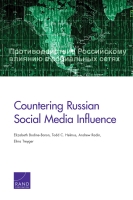by Elizabeth Bodine-Baron, Todd C. Helmus, Andrew Radin, Elina Treyger
Research Questions
What tools and approaches are available to counter Russian social media influence?
What are the current efforts underway to counter this threat, and how effective are they?
What additional steps could be taken, and what would be required for them to be effective?
What are the unintentional consequences or drawbacks of these proposed approaches? Are they outweighed by the potential benefits?
Which approaches have the highest likelihood of success and target multiple links in the disinformation chain?
In January 2017, the U.S. intelligence community released a public report detailing a Russian influence campaign, ordered by Russian President Vladimir Putin, to disrupt the U.S. presidential election. Part of a larger multifaceted approach, this campaign included social media–based disinformation spread by both automated bots and paid trolls. Russia's strategy was to push several conflicting narratives simultaneously, deepening existing divisions within American society and degrading trust in Western institutions and the democratic process.
While it is unknown what impact the campaign might have had on the 2016 presidential election, or on individual opinions, it is clear that Russia's efforts reached many Americans through a variety of social media platforms, including Twitter and Facebook. The Russian "disinformation chain" that directs these campaigns starts from the very top — from Russian leadership, to Russian organs and proxies, through amplification channels such as social media platforms, and finally to U.S. media consumers. This report categorizes and analyzes different approaches and policy options to respond to the specific threat of Russian influence via disinformation spread on social media in the United States. It is meant to educate and inform U.S. government officials considering policies for combating Russian disinformation; social media companies undertaking efforts to reduce the spread of disinformation on their platforms; NGOs, think tanks, and academics developing new approaches to address the threat of disinformation; and the American public.
Key Findings
Russian social media disinformation campaigns can be viewed as a "disinformation chain," winding from Russian leadership, to Russian organs and proxies, through amplification channels such as social media platforms, and finally to consumers. This stylized model of a complex dynamic process is useful for categorizing and analyzing potential approaches for countering the threat.
Experts agree that current efforts to combat Russian social media influence are fragmented and incomplete.
Solutions are independently proposed (and sometimes implemented) by different stakeholders, but rarely are such stakeholders aware of what others are doing, to say nothing of paths of cooperation.
Efforts to increase cooperation and information-sharing are nascent and lack the necessary resources and authorities to make much of a difference.
As it currently stands, there does not appear to be a strategy that delineates tasks and responsibilities for an organized response to Russian disinformation operations in the United States.
Experts also agree that while there is no one single solution to countering Russian social media influence, stronger cooperation between the government and the private sector is clearly needed.
Without cooperation and coordination, efforts will remain piecemeal and inadequate, and the United States will remain vulnerable to influence campaigns by Russia and other adversaries.
Recommendations
Establish clear and enforceable norms for acceptable behavior for states' and media entities' behavior on social media platforms.
Coordinate U.S. executive and legislative branch activities.
Institute a formal mechanism for information-sharing that includes key players from the U.S. government and private social media companies.
Increase the transparency of social media platform policies and algorithms for detecting and removing disinformation and malicious behavior.
Encourage and fund academia to develop better tools for identifying and attributing disinformation on social media.
Prioritize defensive activities over punishments to shape Moscow's decisionmaking.
Continuously assess the cost and impact of proposed solutions relative to the effectiveness of Russia's activities.

No comments:
Post a Comment